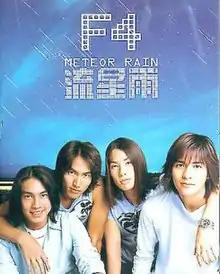Meteor Rain (album)
Meteor Rain (Chinese: 流星雨; pinyin: Liú Xīng Yǔ) is the debut Mandarin studio album of Taiwanese Mandopop quartet boy band F4. It was released on 28 August 2001 by Sony Music Taiwan.[1] The Hong Kong version of the album is an audio visual CD (AVCD) which includes two music videos.[Note 1][2]
| Meteor Rain | ||||
|---|---|---|---|---|
 Meteor Rain (Hong Kong Edition) cover | ||||
| Studio album 流星雨 by | ||||
| Released | 28 August 2001 | |||
| Genre | Mandopop | |||
| Language | Mandarin | |||
| Label | Sony Music Taiwan | |||
| F4 chronology | ||||
| ||||
The album is organized in the style of a split album with two tracks by each of the F4 members and two tracks collectively as F4. The leading track "流星雨" (Meteor Rain, a Chinese cover song of Gaining Through Losing by Ken Hirai) is listed at number 11 on Hit Fm Taiwan's Hit Fm Annual Top 100 Singles Chart (Hit-Fm年度百首單曲) for 2001 as well as the theme song for the 2001 Taiwanese drama series of the same title.[3]
The album was awarded one of the Top 10 Selling Mandarin Albums of the Year at the 2002 IFPI Hong Kong Album Sales Awards, presented by the Hong Kong branch of IFPI.[4] Following the success of their TV series Meteor Garden, the album also received commercial acclaim in Indonesia with sales of more than 300,000 copies.[5]
Track listing
- "流星雨" liu xing yu (Meteor Rain) - F4
- "我是真的真的很愛你" wo shi zhen de zhen de hen ai ni (I Truly Love You/I Really Really Love You) - Jerry
- "Here We Are" - Ken
- "誰讓你流淚" shui rang ni liu lei (Who Made You Cry?) - Vanness
- "為你執著" wei ni zhi zhuo (Persistence For You) - Vic
- "第一時間" di yi shi jian (At The First Place) - F4
- "要定你" yao ding ni (Got To Have You) - Jerry
- "你不愛我愛誰?" ni bu ai wo ai shui (Everywhere/Who Do You Love If Not Me?) - Vanness
- "愛不會一直等你" ai bu hui yi zhi deng ni (Show Me Your Love/Love Will Not Wait For You) - Ken
- "最特別的存在" zui te bie de cun zai (The Most Special Existence) - Vic
Music videos
- "流星雨" (Meteor Rain) MV
- "第一時間" (At the First Place) MV
Controversy
The group's label Sony Music Taiwan encountered controversy in October 2002 when South Korean media noted the similarities between the song "Everywhere" (你不愛我愛誰?) and the popular Korean song "Love and Remember" (사랑해 그리고 기억해), which was originally recorded by K-pop group g.o.d in 1999 as part of their second album and was composed by their producer Park Jin-young.[6] Park filed a lawsuit against Sony Music Taiwan, stating that the song had been remade without his permission.[7] Sony Music Taiwan disputed the case on the grounds that they had purchased the rights from Universal Music, as "Love and Remember" was partly based on Curtis McKonly's arrangement of the Christmas carol "The First Noel".[8] The case was eventually settled out of court when Park was paid compensation by Sony Music Taiwan as they used Park's arrangement of the song.[9]
Sales
| Region | Certification | Certified units/sales |
|---|---|---|
| China | — | 500,000[10] |
Notes
- as listed in the Music Video section
References
- (in Chinese) "Meteor Rain album info" Archived 2011-09-27 at the Wayback Machine Sony Music Taiwan. 28 August 2001. Retrieved 2011-01-25
- "Meteor Rain (Hong Kong Edition) (AVCD) album info" Yesasia. Retrieved 2011-01-25
- "2001 Hit FM Annual Top 100 Singles Chart" HITO Radio. Retrieved 2011-01-20
- "2002 IFPI Hong Kong Album Sales Awards winners list" Archived 2012-07-02 at the Wayback Machine IFPI Hong Kong. Retrieved 2011-04-19
- Benke, Benny (2003-01-11). ""Fantasy 4-ever" Benar-benar Fantastis". Suara Merdeka (in Indonesian). Archived from the original on 2011-09-28. Retrieved 2011-05-09.
- 대만 드라마 '꽃보다 남자' 漢風몰이. JoongAng Ilbo (in Korean). October 16, 2002.
- [연예]가수 박진영 대만음반사 손배소. The Dong-a Ilbo (in Korean). November 29, 2002.
- F4歌曲是抄袭?原作者在韩正式起诉 [Is F4 plagiarizing in his song? Original author formally files suit in South Korea] (in Simplified Chinese). CCTV. December 4, 2002.
- 대만그룹 F4, god 노래표절 파문. JoongAng Ilbo (in Korean). November 24, 2002.
- Pomfret, John (June 10, 2002). "Band Hits Sour Note in China". The Washington Post. Retrieved March 19, 2017.
Within five months, meanwhile, Sony had sold 500,000 copies of the "Meteor Rain" album and estimated that another 5 million pirated versions had flooded the market.